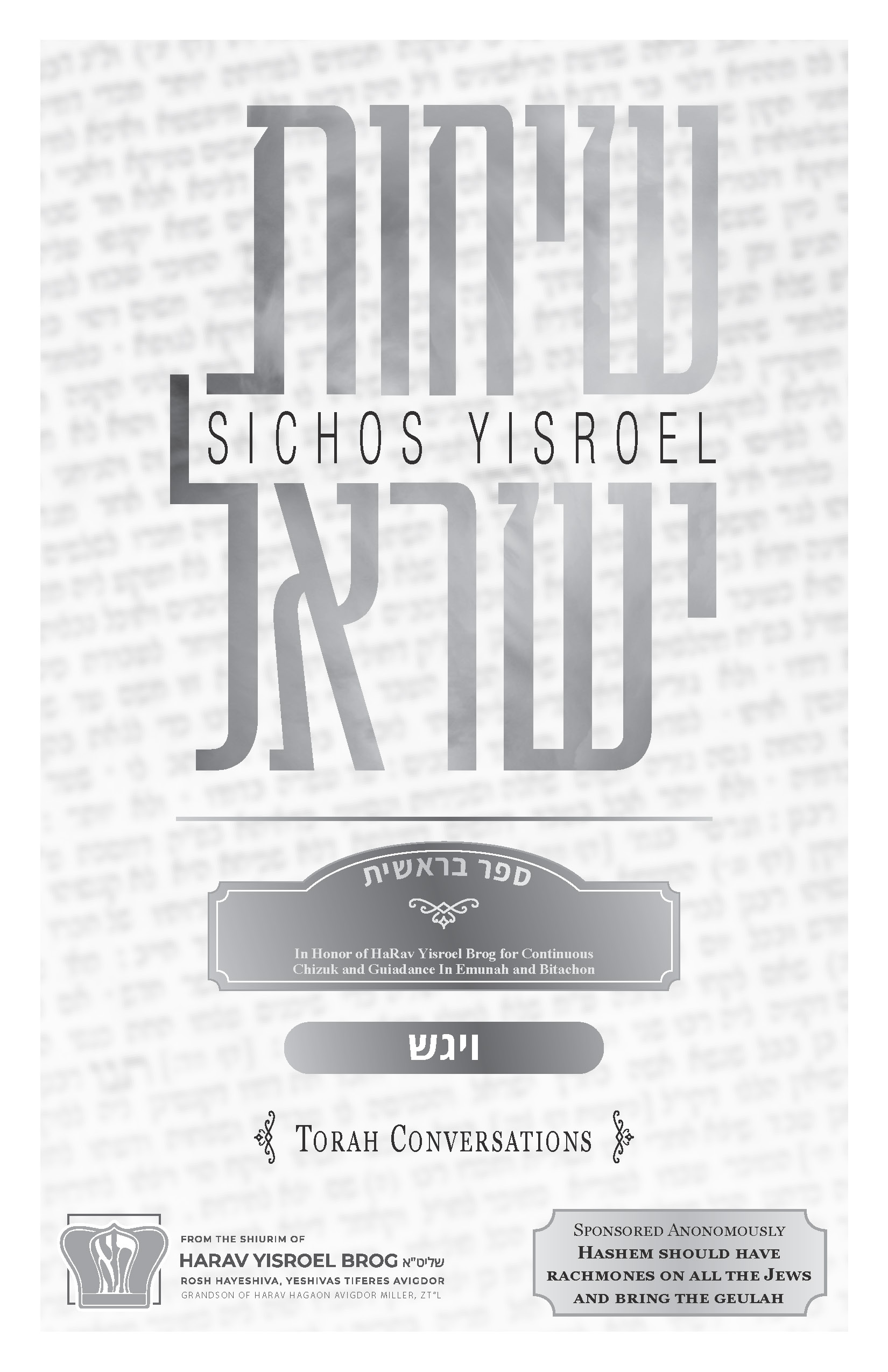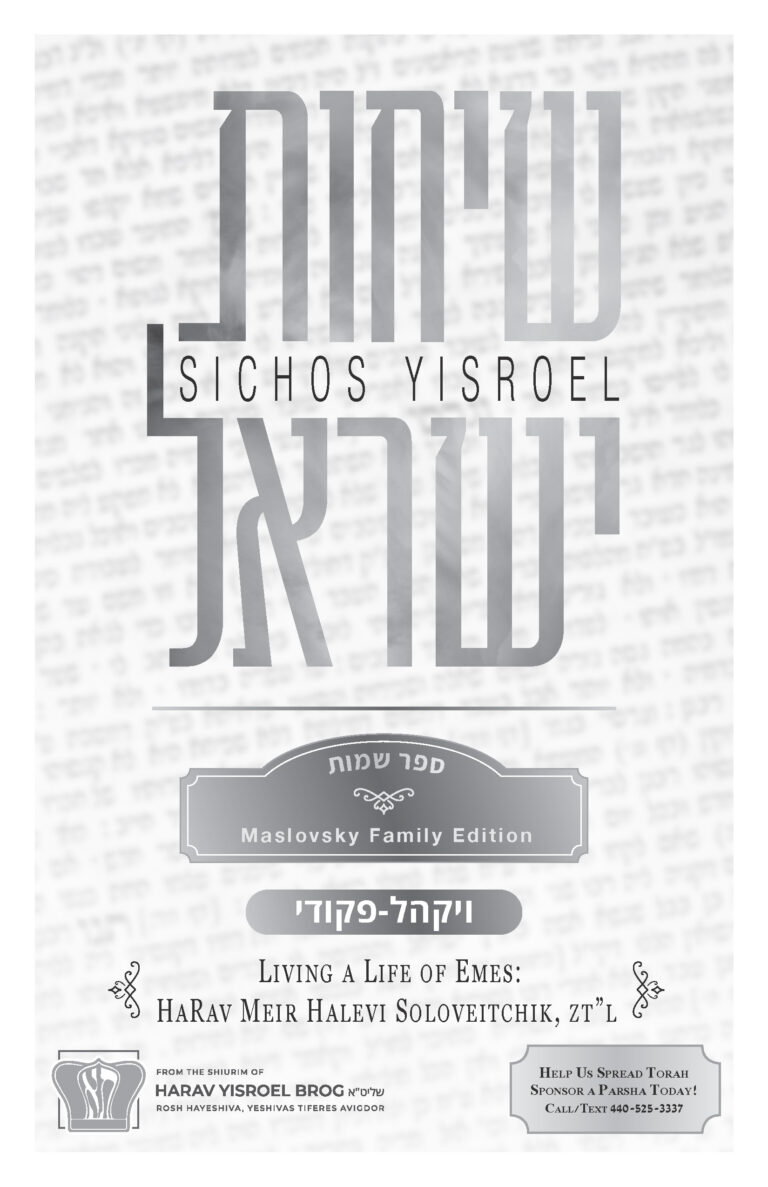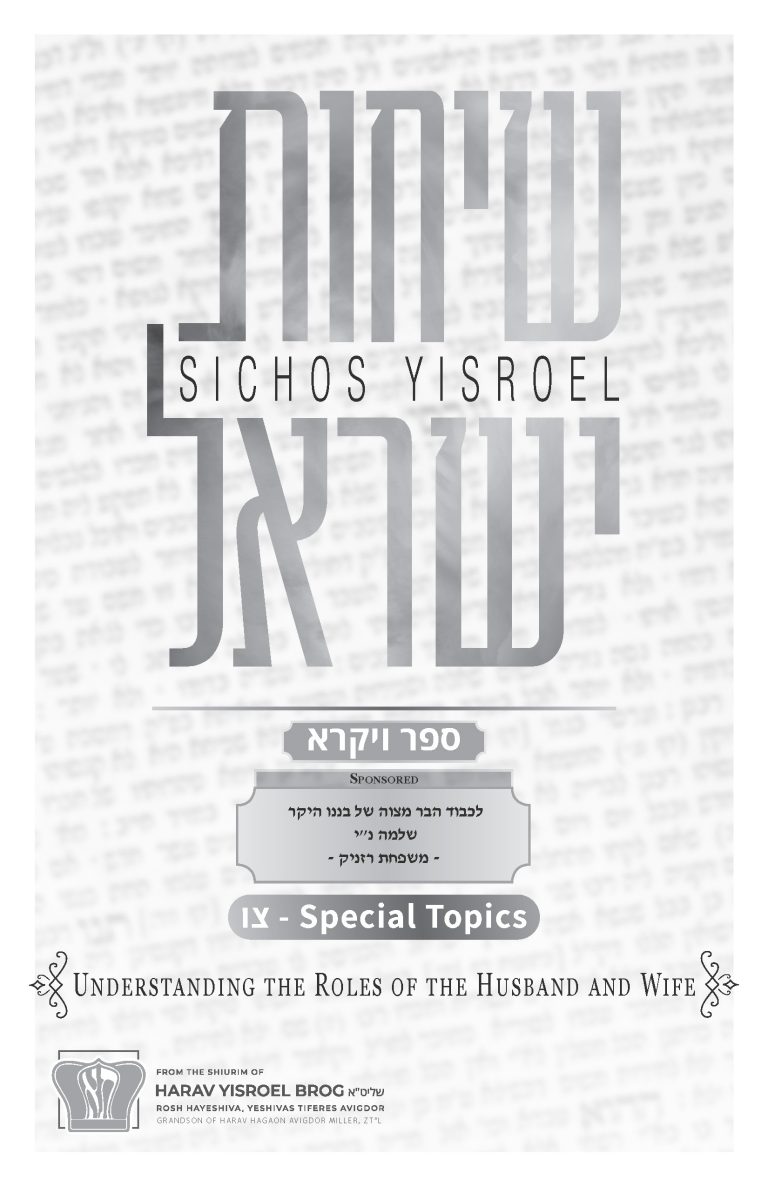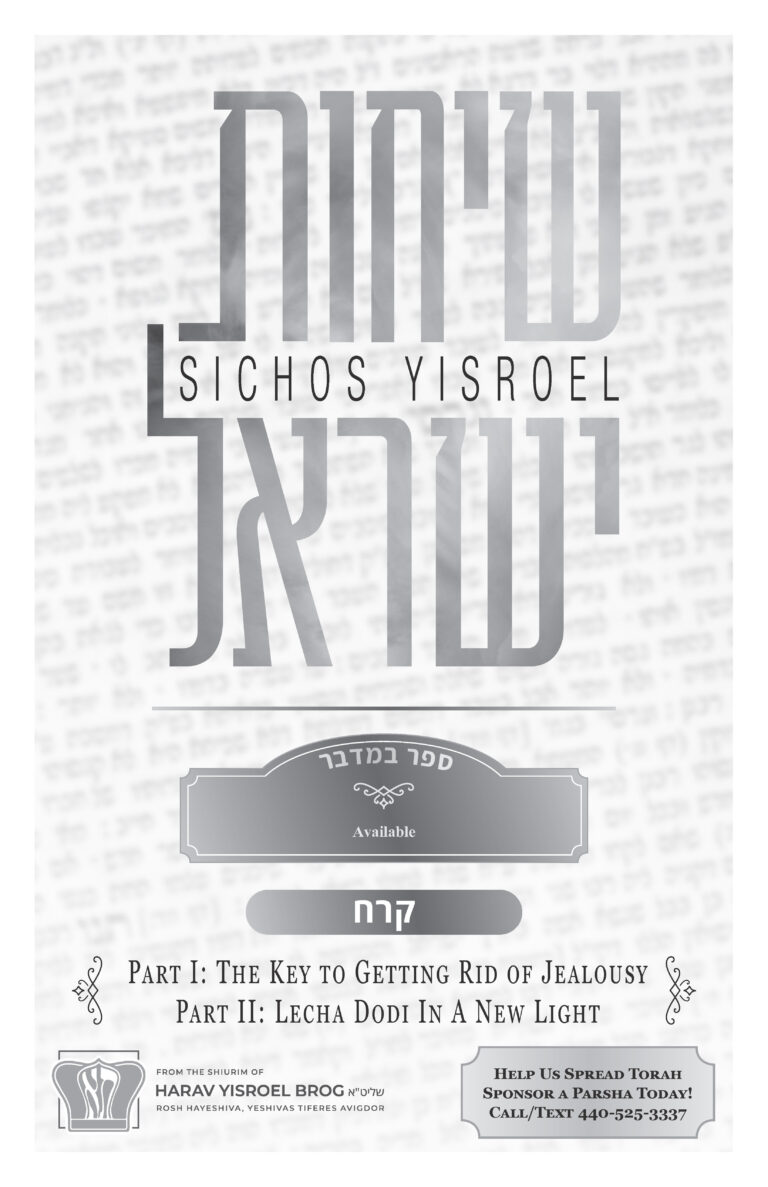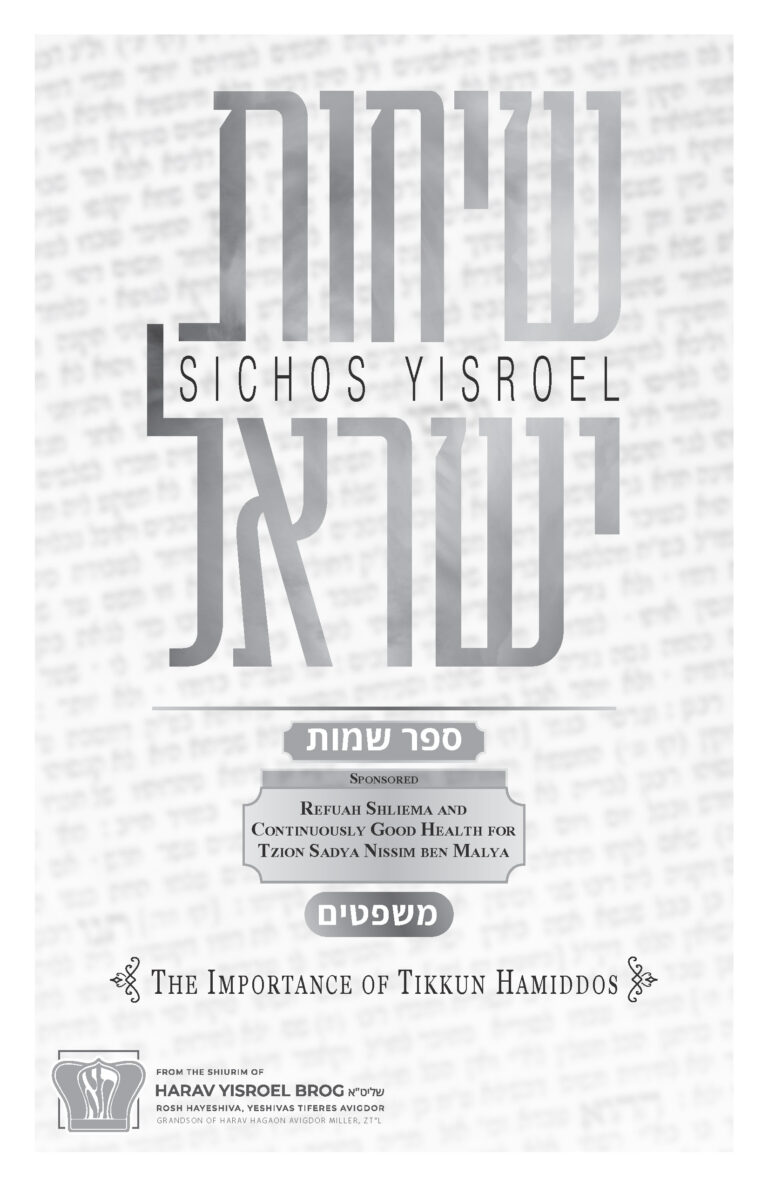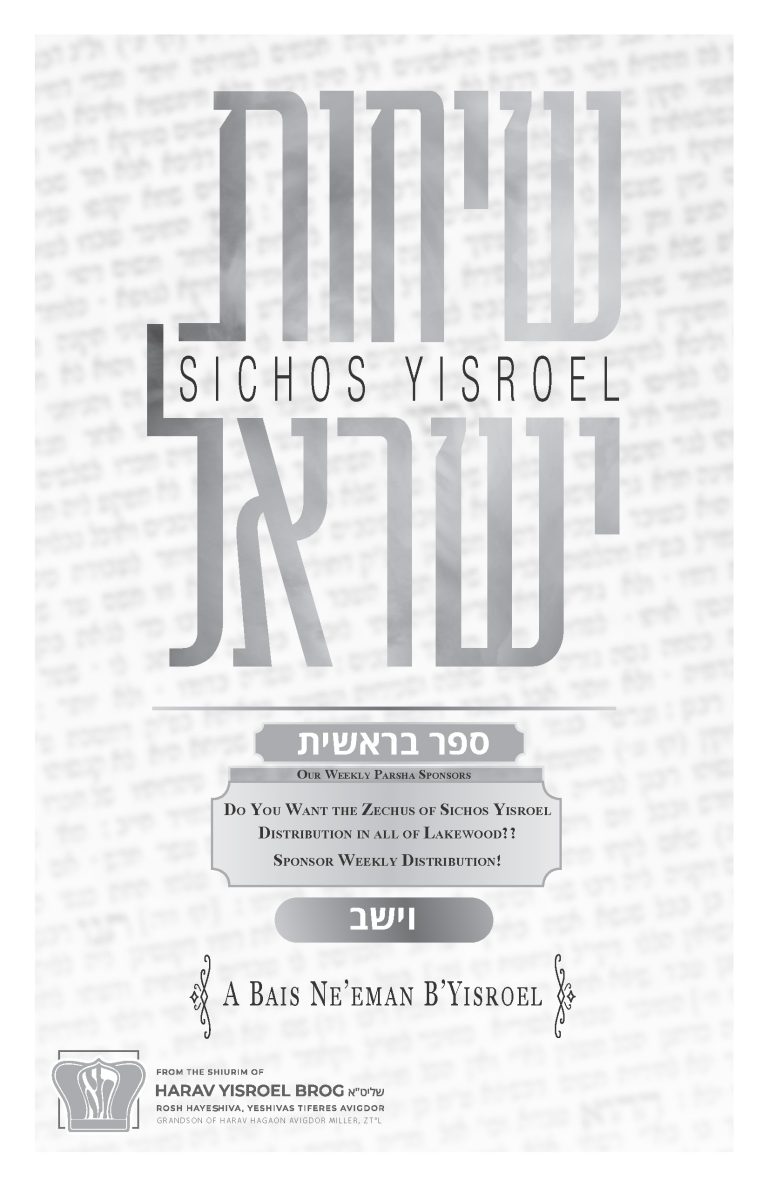Vayigash 5784: Torah Conversations
Sponsored
Hashem should have rachmones on all the Jews and bring the geulah – Anonymous
Consider sponsoring a shiur
Visit YTATorah.org
Shiur presented in 5780
Parshas Vayigash: Torah Conversations (5780)
Brisker Sages Showed the Way in Chinuch
One of the great tovos that Hashem did with me is that He guided me to learn by my great rebbi, Rav Meir Halevi Soloveitchik, the son of none other than Rav Yitzchak Ze’ev Halevi Soloveitchik, the last Brisker Rav.
My father once asked me, “What draws you to Brisk? There are so many yeshivos. Why do you feel drawn to Brisk?” I told him, “There are a lot of great people, but what I found in Brisk was that they seem to have patented something about chinuch of children.” Every parent’s dream is that his children should go in the way that he would like and even become better than him, but very few people actually merit that. In Brisk, they were zocheh almost to clone their kids in their own image. I’ve studied the children of many Briskers, and they all follow in the path of their fathers without question. Perhaps to have one kid who does that, nu, but so many children from so many different families? What do they have? What is it? And it repeats itself generation after generation. Besides their mode of learning and understanding, there is their critical thinking; the way they carry on their mesorah in the most exacting fashion is something to behold.
I always tried to press my rebbi to understand, “What is it? What’s the key? How was the Brisker Rav mechanech you?” A lot of times, he wouldn’t tell me. He didn’t want to say. But sometimes he would open the door for me, and let me take a peek. It was tremendously insightful. To produce an entire generation where not one person questions. And we’re talking about very strong-minded people. They’re not shepselach. They’re not the sheep type. They’re more the shor type, and they’re Shevet Levi. Levi has a strong mind. When something was wrong, he knew how to take care of it. He took care of Shechem. I always wondered, “What did they have?”
I’ll never forget marveling when I saw my rebbi’s 5-year-old child, sitting at the kitchen table writing. He had a little notepad. I was thinking, “A 5-year-old and he’s writing in his notepad!” Now, you expect he would scribble, color, or make pictures. What was he writing? I said to him in Yiddish, “What are you writing there?” He said, “It’s not relevantto you.” I said, “You can’t tell me what you’re writing? I’m curious. Are you already writing chiddushei Torah? What are you writing there?” I managed to open the drawer when the kid walked out, and I took a look at that little notebook. I was blown away like you can’t imagine! There was a little notebook, and it said on the outside Hanhagos mei’avi mori shlita. That means conduct. How my father conducts himself. I remember thinking, “You’re all of 5 years old! What do you know about hanhagos?! What do you know about minhagim?! You barely know how to make a brachah!” No, it was not so. Then I asked him, “Why are you doing this?” He said, “I don’t want to forget.”
Do you know why it was insightful to me? My rebbi told me over things that he saw by his father, or heard from him when he was 4 years old. I remember thinking the first time he told me that, “Give me a break. You heard something from your father when you were 4 years old and you can repeat it to me over 60 years later? Right. I’m sure.” If you told me my father gave me popcorn, maybe I’d believe that. If he gave me a lollipop. But to say over a mesorah? They had it. They had it the way they carry on their mesorah.
The Rambam: Torah and Chochmah Are the Secret of the Mesorah
One of the great lessons my rebbi told me was how his father was mechanech them from the Torah. He viewed the Torah as a book of instructions on how to live one’s life. And they lived by it. They didn’t say, “Oh, the Torah, that’s way up there. That has nothing to do with me.” No! They looked at it and derived how to live from it.
One of the times, I asked him again, and he told me about how his father was mechanech him. He spoke about how the father trained the children regarding their conversations. Conversations, chattering is something that is part and parcel of people’s lives. Some children begin to speak earlier, some a little later, but diburim, conversations is part and parcel of a person’s life. The Brisker Rav would continuously read and mention and remind his children of the following Rambam.
There’s a Rambam at the end of Hilchos Tumas Hatzora’as (16:10).[i] The Rambam says the following: שיחת כשרי ישראל, what is the chatter, what is the talk of kosher Jews? How can you tell if someone is a kosher Jew or not? Today, we usually say, “Are you a shomer Torah umitzvos?” If you are, you must be a kosher Jew. The Rambam says that kosher Jews have a specific way of talking, of communicating, of sichah.
Now, the Rambam says in another place that a talmid chacham has a higher class and a higher standard of talk, in what he talks about. But the Rambam says there’s a sichah of a ‘kosher Yisrael.’ He doesn’t say this about chachamim. He doesn’t say this about gedolim. He says the following is the talk of a basic, kosher Jew.
Convos Of A “Kosher Jew”
And what is that? אינה אלא בדברי תורה וחכמה, only in Divrei Torah and the words of wisdom. You hear that? A kosher Jew’s communication with another Jew, you know what they talk about? Divrei Torah and divrei chochmah. And he repeated this over and over to his kids: “Remember this Rambam. Remember this guidance. This is what the hallmark is. This is the identification of a kosher Jew.” It is not playing Jewish geography. Today, two Jews meet each other and say, “Where are you from?” Today, I got a call from Eretz Yisrael. “You know Samuels?” I said, “Samuels from where?” “From Bork Park. I’m his son-in-law.” “That’s very nice. I hope he’s lucky, and I hope you’re lucky.” He said, “You don’t know Samuels? Where do you live?” I said, “I live in Cleveland. That’s like eight hours away from Boro Park.” That’s how you think. Jewish geography is the game people play. That’s not the sichah of kesheirei Yisrael. If you take note of kesheirei Yisrael, they talk about chochmah.
I’ll never forget when I first came to Eretz Yisrael, I was a very young bachur. I was 17 years old, turning 18. I went to my rebbi‘s house, and I remember I had shoes that had buckles on them. Now, I don’t remember the buckles, but I remember the conversation about the buckles. I was conversing with my rebbi and my rebbi‘s child came in. He was on the floor, he was 3 or 4 years old, and he walked over and started playing with the buckles. The rebbi saw him playing with the buckles. He says to him, “What is that? What’s the purpose of that?” That was the first thing he asked him. Divrei chochmah. He was training him in chochmah. He wanted to hear the kid say that buckles are supposed to hold two things together. I don’t remember if the kid said that or didn’t say that, but I remember I was very impressed with this conversation. It was a little over my head, “Why do you have buckles?” I didn’t understand why they were talking about such silly things. He wasn’t. He was trying to train the child to be aware, to have an awareness. He said, “Those buckles don’t serve the purpose of buckles. They’re just stam for sheinkeit. Some people think it’s nice. They put on extra buckles even though it serves no purpose.”
When he spoke to his children, I always noticed he was challenging their minds. He was asking them questions. He wanted to develop their thinking process, their chochmah.
Now the Rambam says, you should know if a person’s talk and conversation is about things other than Torah, other than chochmah, even if it’s not lashon hara and it’s not rechilus and it’s not asur, this person doesn’t conduct himself in his conversation even like kesheirei Yisrael.
The Brisker Rav used to tell this to his children constantly. And he added that in the earlier generations, when two people met each other, one would ask a question, and the second would say a teretz. When two balebatim met each other and they weren’t able to talk in Torah, you know what they talked about? Divrei chochmah. They said over a ma’aseh from the Sha’agas Aryeh. They said over a ma’aseh from the Vilna Gaon. This is how one inspired the other to become elevated in Torah and yiras shamayim. That’s the sichah of kesheirei Yisrael.
Convos Of “Reshaim”
Then you havewhat the Rambam calls the sichas hareshaim. Here is an example of such a sichah: “It’s terrible what happened to Trump! They mamash stole the election from right under him. Mamash.The democrats are such ganavim, gazlanim, shakranim.”Or someone says: “Did you hear the ‘Torah’ that Rush Limbaugh said today?” A guy called me up. “Did you hear the ‘Torah’ from Sean Hannity?” I said, “I don’t want to hear Sean Hannity’s ‘Torah.’ I’m not interested in him. I’m not interested in anything about this silly election. It’s over with.”
My rebbi told me that there was once somebody running for the parliament in Poland, and the Chafetz Chaim was very supportive of a certain individual. He wrote letters saying people should vote for him. Then, after the vote, somebody came to the Chafetz Chaim, and said, “Did you hear who won?” He said, “No, and it makes no difference. Hashem won.”
Today, the average shoteh takes this last presidential election so personally. You think if Biden won, pashut the world would come to an end. “The war of Gog uMagog is starting already! We should make plans to run to Eretz Yisrael! Renew your passports!” These are people who are so feeble-minded, they just don’t get it. And if some quasi balebus gets up and puts on the internet, “The world, I’m telling you now, is going to be mayhem. It’s going to be war, civil war. People are going to fight with each other.” Are they crazy?!
Zugt the Rambam, sichas reshaim,do you know what it causes? It causes people to sit around in the corners and shmooze. It’s a gathering of amei ha’aretz, ignoramuses. People sit with drinks in a coffee shop, in a bar, and they shmooze over this. This is the same talk as baseball talk. “Did the guy hit the home run? He did not hit it. Did he slip? Did he trip? Was his bat stuffed with rocks? It’s not stuffed with rocks.” Whatever they talk about, shtusim. Such nonsense. It’s amazing that you can turn on a radio for many hours a day and hear people chazering over the ball games! What’s going to be in the next ballgame? What about the ballgame that happened? Whose fault is it? The referee’s fault? This guy’s fault? I mean it’s crazy stuff! It doesn’t say it’s the sichos of fools. The Rambam says this is the sichah of reshaim.
Constant Opportunities For Chochmah Within Your Family
This is a very important lesson: to understand that the hallmark of good, proper Jews is to monitor their conversations. But if you don’t tell your child that, you’re withholding from him or her a lot of tov.
Here is a father who is walking with his child to shul, and the father is such an am ha’aretz thathe doesn’t have what to talk to the kid about. The father doesn’t know what parshah it is. He needs to get his kid’s parshah sheet in order to even find out what that week’s parshah is. And he knows nothing about the parshah – so he talks about politics. He discusses sports. And then, he has a Shabbos table that’s fit for reshaim. “What’s going on in the States? What’s going on in South America? What are the COVID rules now, orange, purple, red?” I mean, it’s meshugene stuff! Who talks like this?! I mean, it’s a matzav that can be seen in the whole world.
Are you a kosher Jew? Where is the davar chochmah in this kind of conversation? It’s unbelievable what’s going on! You have to think about it, rabbosai. And you don’t understand the ramifications of this. You never even heard about this kind of conduct. And this was the chinuch that the Brisker Rav gave to his children.
“Don’t Learn On The Way Home!”
My rebbi said that in this week’s parshah, it says an amazing thing. Yosef, after twenty-two long years of being separated from his family, from his brothers, from his father… what happened? He finally reveals himself to the brothers. And right after that Yosef says, “Hurry up and run back to your father. Travel quickly to your father and tell him that his son Yosef is alive” (Bereishis 45:9).
Now, I have pictured this in my mind – the excitement, the electric atmosphere of that moment! Their father was in aveilus for twenty-two years! I can’t imagine an aveilus of twenty-two years over a tzaddik like Yosef! The brothers now have a mission, “Get back to Papa, get back to Tatty and tell him עוד יוסף בני חי.” Then Yosef says the strangest thing. Do you know what he tells them? אל תרגזו בדרך, “Do not postpone and get sidetracked on the road” (Bereishis 45:24). My rebbi asked, “Why in the world would they get sidetracked?! Are they going to go sightseeing? What are they going to do?!”
If you look in Rashi, he says as follows: אל תתעסקו בדבר הלכה, don’t get involved in a davar halachah, in a matter of Torah, שלא תרגז עליכם הדרך, because if you do, you’re going to definitely get sidetracked. It’s going to slow down your trip.
Where does that come from? What kind of funny pshat is that in Rashi? So my rebbi said, “You know where this comes from? A gemara in Ta’anis (דף י ע”ב).The gemara says that Yosef told his brothers, ‘Don’t be osek in Torah because you’re going to get sidetracked.’[ii] And the gemara asks, איני, it’s not like this. You’re chayav to learn. The gemara says a teaching: R’ Ilai bar R’ Brechyah says, שני תלמידי חכמים, two scholars, שמהלכים בדרך, that are going on the road, ואין ביניהן דברי תורה, and they’re not conversing with each other in Torah, each one is thinking in learning by himself, ראויין לישרף, they deserve to get burnt by a fire. Now that’s a little extreme, don’t you think?! Where do we learn this from? The gemara says an amazing thing. We learn it from the case of the great rav, Eliyahu Hanavi with his great talmid Elisha. They were walking together.
Now what was going on? What was the time like? What happened on that day? That day was the final day that Elisha and Eliyahu were going to be together. Eliyahu was set for a departure on that day. He was departing this world. He was going to become a malach. Elisha knew about it because it says some prophets asked Elisha, “Do you know that Hashem is taking your master today?” and he says, “Yes, I know”Elisha was already a navi. He was a super tzaddik. A super talmid chacham. Eliyahu became a malach on that day. Still in all, you know what it says in the gemara? That if they would have walked along the road and not talked in learning, not been involved in learning, they would have deserved to get burnt by fire! But they were talking in learning, and through the talking in learning, they became separated, and Eliyahu went up and Elisha stayed down here. They had to talk in learning between each other, the gemara says. That’s why the gemara says you can’t have two talmidei chachamim walking along the road and not learning! So how did Yosef tell his brothers not to get involved in a davar halachah?!
The gemara says he didn’t tell them not to talk in learning. What he told them was: אל תתעסקו, “Don’t get involved in depth, לעיוני. Don’t get too involved in your learning. Just talk lightly in Torah.” But to conceive of the idea that two Yidden should walk on a road and not talk in Torah?! That’s unimaginable!”
The Brisker Rav pointed out a peledike zach. My rebbi said it over from his father. Yosef Hatzaddik was forced to tell his brothers not to get deeply involved in a davar halachah. Why didn’t he tell them, “Do me a favor, brothers? You’re going back now to Abba. Don’t get involved in any conversation on the way home.” You know what they could have talked about on the way home?
They could have said, “Oh my gosh! Do you believe that Yosef is alive?! Do you believe that Yosef is the king of Mitzrayim?! Do you believe Yosef is still frum?! Do you believe Yosef still remembers the last gemara he learned with Abba?! Do you believe it?! What’s the chance of this happening?! Twenty-two years! What happened to Yosef?! What did he do during these twenty-two years?!” They could have conjectured and offered sevaros left and right. They could have said, “Wow, our father is now twenty-two years in mourning. His mourning is coming to an end!” They took down Yehudah. Yehudah was the king of the family. They had taken him down from his position because they saw how bad their father felt. They said at the time, “It’s your fault. You were the leader.”
They could have also talked about everything that happened to them in Mitzrayim. Things were put in their sacks. They were put in prison. Their brother, Binyamin, was taken away and imprisoned! They had so much politics to talk about! And yet, they didn’t! Unbelievable!
You go to a siyum shas and you come home from a siyum hashas and what do you think every car is talking about? Do you think anybody is discussing starting Brachos again? No. “Did you see that crowd? That was amazing! Did you see the dancing? Did you hear that guy’s speech? That was amazing. It was so freezing. Oh, it was cold. All the rabbis came in scarves. Did you see this? Did you see that? Did you like his story? Oh wow, it was amazing! How many times do Jews of that number get together?!” They say the same thing over and over. Then you get home, and your wife says, “How was it?” “Oh, let me tell you…” And you start the whole shiur all over again. And for the next couple of days, you’re looking for somebody who wasn’t there, so you can repeat the whole thing again.
My friend, do you know what the whole lesson of the siyum hashas was? Start learning shas! Why don’t you say, “Let’s start shas right now, mei’eimasai korin es shema be’arvis?” No, we tend to talk all about it first.
“The brothers had what to talk about,” my rebbi said, “like you can’t imagine!” Who is to blame? Blamed for what? Why this? Why that? But we see that Yosef didn’t even think of the possibility that his brothers, who were kesheirei Yisrael,would even entertain the thought in a million years of doing anything but learning on the way home! Do you hear this? He couldn’t even imagine that they would discuss anything but a davar halachah! The only thing Yosef was afraid of was that they would get too involved in the sugya. They would learn too deeply, and it would be mamash unbelievable! But that they would talk devarim beteilim?! He had no such hava amina whatsoever, never! He had no safek they would go back to their learning immediately, as soon as they left. They could have said, “Wow! That was a nice meal. Or that was a close call. We could have had a lot of trouble today.” Yehudah could have said, “I would have beaten those guys. I would have destroyed cities. I would have turned over Mitzrayim.” They made all kinds of plans. That was a happening day. That was the most shocking day of their entire life. There was no need to warn them not to talk about it. “Don’t shmooze. Don’t get into any fights. Don’t get into any arguments.” Only one thing.
R’ Miller Always Walked With Hashem
My grandfather (Rav Avigdor Miller) was a man who walked with Hashem and lived with Hashem and he followed the directives of Hashem. I spoke to him many times in my life. He never had a conversation with me like, “So how’s it going? How’s life treating you? How are things going?” I once asked him. I said, “Zeida, I don’t understand you. I come back from Eretz Yisrael. I’m sitting at your table. We’re talking. And yet you don’t ask me one question about what it’s like in Eretz Yisrael. You don’t ask me one question. Why not?” You know what he said to me? The most simple answer. “Of what benefit would that be? What would you gain and what would I gain? What’s the gain?”
Now, he told me silly stories. He did tell me silly stories. But it was exact. He told me stories that he felt would be mekarev me, but to talk about things that had no value? Never. He was always standing in the presence of Hashem. He spoke divrei chochmah at his table. I ate at his table many times. He never spoke about anything mundane. It wasn’t like he wasn’t aware of politics. In the right venue, when it was nogea, in one of his classes maybe, he would speak about it. If it was nogea to hashkafah. But he didn’t just chatter. He wasn’t an ignoramus. He spoke about things that were nogea to chochmah and to Torah.
I don’t even know how the brothers could have met Yosef and walked away after selling him and not seeing him for twenty-two years without talking about it! How could you walk away and not say, “Guys, whew! We are lucky ducks. We sold this man and the man didn’t shecht us. He befriended us. He was nice to us. He was friendly to us. I can’t believe it. Maybe he was a big tzaddik, afterall. Maybe we misjudged him. No more. That’s it. Right, let’s talk in learning.”
Prepare When You Walk With Your Children
When a father is walking with his children in the street, he has to prepare what he’s going to talk to his children about, at least a davar chochmah. The problem is the father’s head is an empty can. It’s והבור רק אין בו מים. You know what the father knows to talk about? “Hey, son, did you just see that Lexus? Did you see that oversized Suburban? Did you see the tires on that car?” “Yes, Tatty, I saw it.” “Aren’t those nice?” “Sure Tatty.”
Doesn’t the Rambam say if you talk about nonsense like that, that’s what reshaim of Yisrael talk about? Jewish reshaim talk about that. Well if הבור רק, the pit is empty, אין בו מים, there is no mayim in there (i.e., no Torah). You know what’s in there? נחשים ועקרבים, snakes and scorpions. You talk about phones. You talk about iPads, computers. Lots of stuff. Miles. Vacations. “Son, where would you like to go during the winter break?” That’s Shabbos table talk? We’re not talking like kesheirei Yisrael. You have to train yourself so you will know what kosher Jews talk about.
Targeted Conversations: Make It Nogea!
I remember my rebbi gave this over from his father. I remember thinking: “Thank You, Hashem! I can’t thank You enough. You’re giving me a bird’s eye view into the ‘classroom’ where the Brisker Rav was mechanech his children. Do I have any shaylah, any question now why his kids turned out like that? No.” I was with my rebbi for hours. He could talk and talk about everything under the sun, but it was always nogea. If he spoke about a certain person, it was always about a certain hashkafah of that person. He never mentioned one word personally about that person.
I just became aware this past weekend that my rebbi was very close to a very special man, Rav Avraham Wolfson (1956-2020), [the son of R’ Zev Wolfson]. Now, I was close with my rebbi for forty years and I know a lot about him, more than most people know about him. My rebbi never mentioned to me that, “I have a shaychus to Rav Avraham Wolfson.” You know what he told me? This is the only thing I remember hearing from him. “I’m nispael,” he told me. “I meet people who are ba’alei mamon. Hashem bentched them with mamon and all they want to do is talk in learning. They want to talk in Torah.” So I said, “Who?” He ignored the question. I said, “Who are you talking about?” He said, “What’s it nogea? I just told you something. Somebody was here,” he said, “a gvir and he ligt in learning. He wanted to know pshat in a gemara, in a Tosfos. It’s not nogea to talk about who it was. Why should I say that?” That’s how he was. He lived his life with the words of his father, with divrei chochmah.
You have some people who like to talk about crazy medrashim. They enjoy that kind of talk. “Did you know, Noach had six heads,” or, “Did you know Avraham Avinu really had forty-two wives and forty-five children?” That stuff is not even nogea. It’s not divrei chachmah. That’s jokes. Like I just saw this week in a sefer. The Torah says בנימין זאב יטרף, “Benjamin is a ravenous wolf” (Bereishis 49:27). Binyamin was able to change himself into a wolf. He was an adam one minute and then he could become a wolf. I was thinking to myself, “What’s the lesson in that?” That’s weird stuff. That’s very strange stuff. Maybe that’s where the idea of a werewolf came from. I don’t know.
My rebbi used to say, “Sometimes Hashem makes it that certain things should be left hidden, unrevealed. It’s not relevant, not nogea.”
Rabosai, let’s be mechazek ourselves. If you walk with somebody, at least say a davar Torah. You walk back and forth on Shabbos, you walk back and forth during the weekdays, sometimes. At least say a davar chochmah. Say a ma’aseh of hashgachah pratis. Say a ma’aseh of emunah and bitachon. Say a ma’aseh about gadlus haBorei. Know something about gadlus haBorei. And if you’ll do that, you’ll have shaychus to kesheirei Yisrael.
The Bottom Line
When Yosef HaTzaddik sent his brothers home to bring their families and Yaakov Avinu to Mitzrayim, he told the brothers not to get “sidetracked on the road.” Chazal and Rashi explain to us that Yosef specifically instructed his brothers not to get involved in deep “dvar halacha” discussions on the way, which would inevitably sidetrack them on their important journey. The Brisker Rav gives us an incredible insight into this Chazal, namely, that it didn’t even enter Yosef’s mind that the brothers would discuss and review anything but Torah topics on their way back! After all, any other group of people would naturally discuss, with utmost excitement, the miraculous events that just unfolded in the royal palace and all that had transpired over the previous twenty-two years! But not the brothers of Yosef! We also saw the Rambam who laid down an important halachic and hashkafic dictum (perhaps based on that Gemora in Ta’anis) that the conversations of “kosher Jews” should only be in divrei Torah and divrei chochmah. As we saw from numerous stories of the Brisker Rav, Rav Miller, and other tzaddikim, who instilled this concept in their children, this halachic principle is an essential element in the chinuch of our children. This coming Shabbos, I will prepare in advance a small lesson from the parsha or a relevant hashkafic idea or a few short stories of tzaddikim to share with my son or daughter as we walk together to shul and sit at the Shabbos table later on. Besides bonding with my child and using the Torah ideas to mechanech them, it will also serve as a good reminder that this is how “kosher Jews” talk and will help me monitor my conversations at the Shabbos table as well.
[i] וכו’, ועל ענין זה [לשון הרע] מזהיר בתורה ואומר (דברים כד ח) “השמר בנגע הצרעת” (דברים כד ט) “זכור את אשר עשה ה’ אלהיך למרים בדרך”. הרי הוא אומר התבוננו מה ארע למרים הנביאה שדברה באחיה שהיתה גדולה ממנו בשנים וגדלתו על ברכיה וסכנה בעצמה להצילו מן הים והיא לא דברה בגנותו אלא טעתה שהשותו לשאר נביאים והוא לא הקפיד על כל הדברים האלו שנאמר (במדבר יב ג) “והאיש משה ענו מאד” ואף על פי כן מיד נענשה בצרעת. קל וחמר לבני אדם הרשעים הטפשים שמרבים לדבר גדולות ונפלאות. לפיכך ראוי למי שרוצה לכון ארחותיו להתרחק מישיבתן ומלדבר עמהן כדי שלא יתפס אדם ברשת רשעים וסכלותם. וזה דרך ישיבת הלצים הרשעים בתחלה מרבין בדברי הבאי כענין שנאמר (קהלת ה ב) “וקול כסיל ברב דברים”. ומתוך כך באין לספר בגנות הצדיקים כענין שנאמר (תהילים לא יט) “תאלמנה שפתי שקר הדברות על צדיק עתק”. ומתוך כך יהיה להן הרגל לדבר בנביאים ולתת דפי בדבריהם כענין שנאמר (דברי הימים ב לו טז) “ויהיו מלעבים במלאכי האלהים ובוזים דבריו ומתעתעים בנבאיו”. ומתוך כך באין לדבר באלהים וכופרין בעקר כענין שנאמר (מלכים ב יז ט) “ויחפאו בני ישראל דברים אשר לא כן על ה’ אלהיהם”. והרי הוא אומר (תהילים עג ט) “שתו בשמים פיהם ולשונם תהלך בארץ” מי גרם להם לשית בשמים פיהם לשונם שהלכה תחלה בארץ. זו היא שיחת הרשעים שגורמת להן ישיבת קרנות וישיבת כנסיות של עמי הארץ וישיבת בתי משתאות עם שותי שכר. אבל שיחת כשרי ישראל אינה אלא בדברי תורה וחכמה. לפיכך הקדוש ברוך הוא עוזר על ידן ומזכה אותן בה. שנאמר (מלאכי ג טז) “אז נדברו יראי ה’ איש אל רעהו ויקשב ה’ וישמע ויכתב ספר זכרון לפניו ליראי ה’ ולחשבי שמו”: סליקו להו הלכות טמאת צרעת, ע”כל.
[ii] ״אל תרגזו בדרך״, אמר רבי אלעזר, אמר להם יוסף לאחיו: אל תתעסקו בדבר הלכה, שמא תרגזו עליכם הדרך. איני? והאמר רבי אלעאי בר ברכיה: שני תלמידי חכמים שמהלכים בדרך ואין ביניהן דברי תורה – ראויין לישרף, שנאמר: ״ויהי המה הלכים הלוך ודבר והנה רכב אש וסוסי אש ויפרדו בין שניהם״, טעמא דאיכא דיבור, הא ליכא דיבור – ראויין לישרף! לא קשיא: הא – למיגרס, הא – לעיוני.
